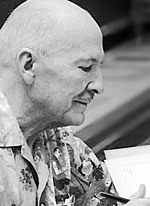Portal:Speculative fiction/Selected biography/22
Robert Anson Heinlein (July 7, 1907 – May 8, 1988) was an American science fiction writer. Often called "the dean of science fiction writers", he was one of the most popular, influential, and controversial authors of the genre. He set a high standard for science and engineering plausibility and helped to raise the genre's standards of literary quality. He was one of the first writers to break into mainstream, general magazines such as The Saturday Evening Post, in the late 1940s, with unvarnished science fiction. He was among the first authors of bestselling, novel-length science fiction in the modern, mass-market era. For many years, Heinlein, Isaac Asimov, and Arthur C. Clarke were known as the "Big Three" of science fiction.
Within the framework of his science fiction stories, Heinlein repeatedly integrated recognizable social themes: The importance of individual liberty and self-reliance, the obligation individuals owe to their societies, the influence of organized religion on culture and government, and the tendency of society to repress non-conformist thought. He also examined the relationship between physical and emotional love, explored various unorthodox family structures, and speculated on the influence of space travel on human cultural practices. His 1961 novel Stranger in a Strange Land put him in the unexpected role of a pied piper of the sexual revolution, and of the counterculture, and through this book he was credited with popularizing the notion of polyamory.

